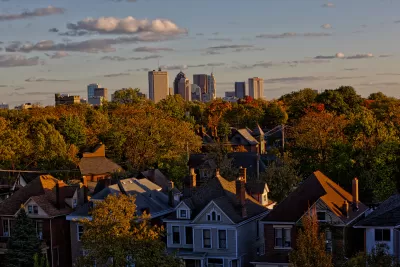Columbus has approved six zoning code amendments, which include height limit increases from three stories to 16 and eliminate parking requirements for large developments in 12,300 parcels along major transportation corridors.

The Columbus Dispatch reports that the “Columbus City Council voted Monday to overhaul the city's zoning code, paving the way for new higher-density development in parts of the city.” The unanimous vote on all six resolutions amending the city’s zoning code comes after years of planning and months of public meetings and concerns about how increased density would affect the city. “At the Monday meeting, council members said the change will help modernize the code into a more lenient process, eliminate delays, keep up with Columbus' growing population, and ease the housing shortage in the future,” as well as fix “a broken system plagued by a history of redlining, or discriminatory financial practices historically used against marginalized communities such as racial or ethnic minorities,” writes reporter Cole Behrens.”
As part of the zoning changes, Columbus has targeted 12,300 parcels along major bus corridors throughout the city and allows for case-by-case height and parking variances to help increase the number and affordability of new housing units. Building heights in these zones, previously restricted to 35 feet, can now go as high as 16 stories along some major streets; in most instances, to get the maximum height allowed, developers will have to meet an “affordability requirement” that “grants them two to four extra stories, based on the category, if developers provide the required amount of affordable housing.” The code also eliminates parking requirements for large developments, which previously were required to provide hundreds of off-street parking spaces, often in the form of expensive underground garages.
FULL STORY: Columbus approves sweeping zoning changes, increasing height limits in parts of city

Alabama: Trump Terminates Settlements for Black Communities Harmed By Raw Sewage
Trump deemed the landmark civil rights agreement “illegal DEI and environmental justice policy.”

Planetizen Federal Action Tracker
A weekly monitor of how Trump’s orders and actions are impacting planners and planning in America.

Why Should We Subsidize Public Transportation?
Many public transit agencies face financial stress due to rising costs, declining fare revenue, and declining subsidies. Transit advocates must provide a strong business case for increasing public transit funding.

Understanding Road Diets
An explainer from Momentum highlights the advantages of reducing vehicle lanes in favor of more bike, transit, and pedestrian infrastructure.

New California Law Regulates Warehouse Pollution
A new law tightens building and emissions regulations for large distribution warehouses to mitigate air pollution and traffic in surrounding communities.

Phoenix Announces Opening Date for Light Rail Extension
The South Central extension will connect South Phoenix to downtown and other major hubs starting on June 7.
Urban Design for Planners 1: Software Tools
This six-course series explores essential urban design concepts using open source software and equips planners with the tools they need to participate fully in the urban design process.
Planning for Universal Design
Learn the tools for implementing Universal Design in planning regulations.
Caltrans
Smith Gee Studio
Institute for Housing and Urban Development Studies (IHS)
City of Grandview
Harvard GSD Executive Education
Toledo-Lucas County Plan Commissions
Salt Lake City
NYU Wagner Graduate School of Public Service





























